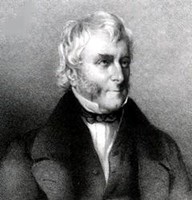|

|
General
William
Johnson
1777-1863
|
The squire of Witham for almost half
a century was William Augustus Johnson, an English soldier and Member of
Parliament who came to the village quite by chance.
He was born at Kenilworth on 15th October 1777, the eldest son of Church
of England clergyman, the Rev Robert Augustus Johnson, Rector of
Wistanstow, Shropshire, and Anna Rebecca,
youngest sister of William, Lord Craven, and a descendent of Archdeacon Robert
Johnson.
After education at Rugby School, he entered the army at the age of 16 and
was commissioned as an ensign of foot in the 32nd (Cornwall) Regiment in
1793 and promoted captain in 1794, six months before his 17th birthday,
and major in 1803, serving in the campaign of 1808-9 in the Peninsular War
and was present at the battles of Roliša and Vimiero before taking part in
the celebrated retreat to Corunna.
He subsequently served through the disastrous Walcheren expedition in
Holland in 1809 but escaped the disastrous epidemics of dysentery and
fever that decimated the British forces and in 1810 he became
lieutenant-colonel in the 3rd Ceylon Regiment, returning to the Peninsular
where he fought in the crucial battle of Salamanca in 1812.
In 1814, Johnson inherited the Witham-on-the-Hill estate from his uncle,
George William Johnson, and
left active military duty on half-pay to run it, a fortuitous decision
because his regiment was part of the division that bore the brunt of
Napoleon's assault at Waterloo in 1815 when all of its officers became
casualties and both its lieutenant-colonels killed. Johnson maintained his
commission in the army and continued to receive
promotions, to full colonel in 1819, major-general in 1830 and
lieutenant-general in 1841, although the general officer ranks were
honorary and he received no pay or pension entitlements.
He retired from the army in 1842, having married Lucy Foster (1815-90),
eldest daughter of the Rev Kingsman Foster, Rector of Dowsby, on 17th February 1835. She was just 19
and he was 57, and they went on to have nine children, three boys and six
girls, the youngest being
born when he was 77.
After becoming squire of Witham, he supported all local activities,
particularly the school and the church and established the first lending
library in the village in 1856. He also maintained a practical interest in
agriculture by experimenting with crops such as flax and also took a great
interest in the activities of his tenants, offering them help and advice
whenever he could.
Johnson was also a leader in the
construction of houses, barns and outbuilding for his tenants, all built
at the centre of the farm to increase efficiency by reducing travelling
time to and from work. Until then, most of the farming community lived in
the villages and walked several miles each day to and from the fields but
his initiative made it easier to live and work in the vicinity and also
reduce the carting of manure at seed time and corn at harvest time over a
shorter distance and was therefore less expensive. "If landlords would
follow the general's example they would grant a great boon to their
tenants and in the long run operate to the advantage of landlords, tenants
and labourers", said one commentator at the time.
He appointed his cousin, the Rev William Henry Johnson,
as Vicar of Witham at the age of 24, a position he held until 1877 and one
of the major restorations of the church took place during his incumbency.
In 1831, soon after the death of George IV, he donated a bell to St
Andrew's Church with the following verse engraved on it: "May 29 [Charles
II's birthday] ye must not ring; not yet the 5th of each November, nor
upon the crowning of a king".
Johnson stood many times for Parliament as a Liberal and served as the
member for Boston (1821-1826) and for Oldham (1837-1847). He was also a
magistrate, sitting as chairman of the Kesteven Quarter Sessions which was
held at the Town Hall in Bourne for 32 years, Deputy Lieutenant of
Lincolnshire and Northamptonshire and High Sheriff of Lincolnshire for
1830.
When slavery was abolished in 1833, he received compensation for the loss
of slaves in Antigua.
General Johnson badly injured his hip during a fall in his study and died
a few days later on 26th October 1863,
aged 86. He was buried at St Andrew's Church.
"As a country gentleman and landlord,
General Johnson was deservedly held in the highest respect", reported the
Stamford Mercury. "He was at all times accessible and courteous and
lived upon the best of terms with his neighbours, whether of high or low
degree."
After his death, the estate passed to
his second son, Augustus Charles Johnson, his eldest son, Robert, having
been killed in April 1855 at the age of 19 in an accident at Portsmouth dockyard
while serving as a captain in the Royal South Lincoln Militia which was
guarding the military depot there while the regular army were away fighting in the Crimean War.
Augustus Charles therefore became the new
Squire of Witham and also High Sheriff of Lincolnshire (1869) and a county
councillor. However, he was far less prudent than his father and was soon
dogged by money troubles with his time being taken up negotiating loans
and mortgages while his relationship with tenants and workers suffered. He
eventually sold the estate in 1902, leaving Witham never to return except
to be buried in the churchyard when he died in 1910, aged 73.
NOTE: Acknowledgments to Wikipedia and to A
Piece of the Puzzle, published by
Witham-on-the-Hill Historical Society (2000) for additional biographical
details.
Portrait from an etching, courtesy Lincolnshire Archives.
See also
When the
squire gave a party

Go to:
Main Index Villages
Index
|
